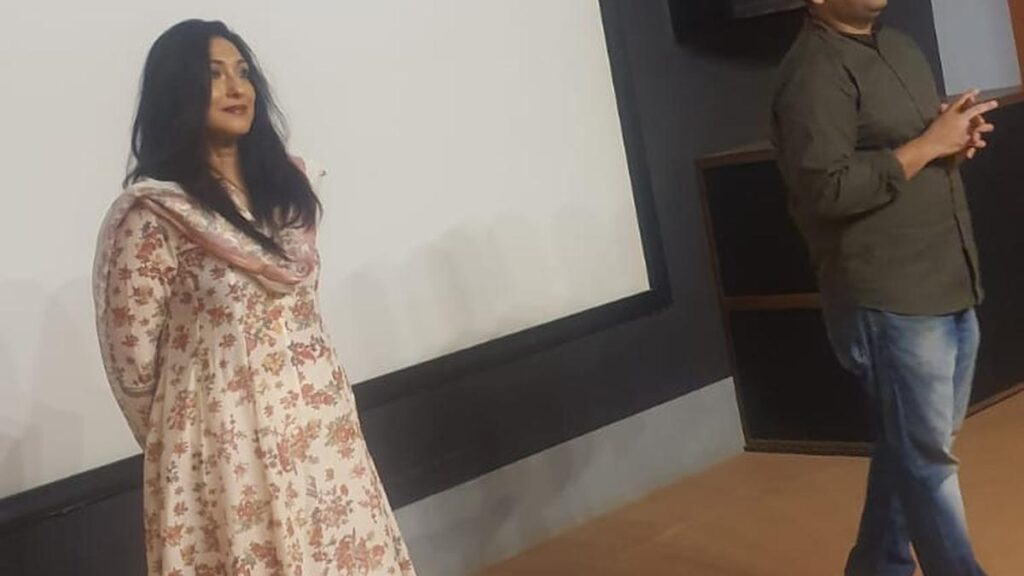Indian cinema, irrespective of the region or language of making, has increasingly been striking a chord with global audiences, says actor-producer Rituparna Sengupta.
The actor, who was in Auroville recently for a preview screening of her upcoming release Goodbye Mountain at Cinema Paradiso, said many Indian films continue to be well received at prominent international film festivals.
The actor, whose national award for best actress in Rituparno Ghosh’s Dahan (1997) ranks as the crowning achievement among the several trophies of a long career, says that if one looked at Indian cinema as a totality of regional productions, there is no rationale for compartmentalising movies by geography or language.
“Cinema is global right now. I believe that when we are doing an Indian film, we are also creating a global platform where the language of its storytelling is no longer a limiting factor to how a viewer anywhere in the world identifies with it,” she said.
In fact, her own new Bengali release, Puratawn, whose aura was enhanced by the return to the screen of yesteryear star Sharmila Tagore after 14 years, had made waves at the Washington DC South Asian Film Festival recently, even bagging the Best Film award.
Rituparna and director Indrasis Acharya were back at Auroville’s Cinema Paradiso, where they had presented their previous collaboration, The Parcel (Bengali) a few years ago, was to showcase their latest to an international audience.
Auroville is a unique place where one gets to screen to a global audience, Rituparna noted, echoing the director’s remark about the screening being the film’s unofficial world premiere.
Goodbye Mountain, a mature romance set in the breathtakingly beautiful terrain of Wayand in Kerala, is a synergistic collaboration between a director inclined to delve into the psyche of people in a relationship, and an actor with a penchant for nuanced portrayals.
The film throws up searching questions about love, happiness and fulfilment in a stable relationship.
“It is a very different kind of understanding about life”, she said, about the film theme that she expected would resonate with global audiences.
Often, even in relationships with stable fundamentals, either partner could be searching for something that gives solace or a sense of release for the rest of their lives. “Just because some people do not like to open up about their lives, it does not remove the void … on the contrary it is necessary in life to be truthful to the self and face something, however difficult the process can be.” “I always want to get into these sorts of spaces”, said Rituparna, who enjoys relationship-based films woven around love.
The actor points out that as society has changed, so has the nature of relationships and associated issues. “There is such a diversity of relationships in society, from live-in to pre-nuptial agreements… that it is difficult to find a way to deal with issues complicating these relationships. Our cinema should shine a light on what is happening around us… and explore how complex relationship issues manifest even between mature individuals”.
She is particularly thrilled by the audience response to Puratawn, which explores a deep-rooted relationship of the mother and daughter, and how the interpersonal transcends to a multi-dimensional dynamic within different members of the family.
The fact that people thronged the theatre to watch the film is both a vindication of good cinema and the value attached to the theatre experience, she said.
The actor of over 200 films, predominantly in Bengali, Hindi and Bangla, still harbours a hunger to be an eager student of cinema, explore new dimensions to playing a role and work with filmmakers with diverse storytelling styles.
“I revel in creatives spaces that allow me to try different things and to give my best as an actor to a character.”
It is an attitude that has produced a versatile filmography that includes the Rituparno Ghosh masterpiece Utsav, the titular role in Tarun Majumdar’s Alo, the romcom Mein, Meri Patni or Woh (2005), Bumm Bumm Bole (2010), Priyadarshan’s Hindi remake of Iranian filmmaker Majid Majidi’s Children of Heaven, Bansuri (Hindi) by Hari Vishwanath or Rajkahini (Bengali/2015) set against the backdrop of the Partition — playing the lead in an ensemble cast as Begum Jaan, she still regards as a role of a lifetime.
“I still love the flamboyant roles.. those are experiences that have shaped and enriched me as an actor. But then, as much as I am a product of commercial cinema, I am also a product of good middle-road, parallel cinema”.
Rituparna looks forward to quite a few projects, some due for release, others involving interesting scripts with pivotal roles. Her upcoming movies include the thriller Madam Sengupta (Bengali) in which she plays a cartoonist and Ittar (Hindi), a mature love story.
“I want to be known as my characters from my films whether it is as Ritika or Anandi”, the actor said, referring to the characters she plays in Puratawn and Goodbye Mountain.
Published – May 09, 2025 09:05 pm IST
Source:https://www.thehindu.com/news/cities/puducherry/indian-cinema-is-increasingly-striking-a-chord-with-global-audiences/article69557324.ece

